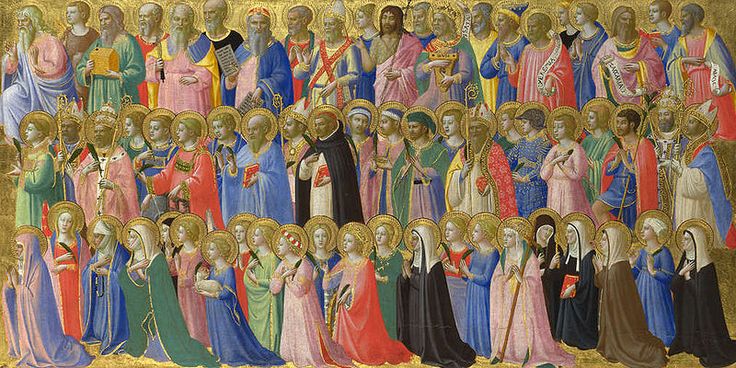The Festivals of Saints (XIV)

CHAPTER XIV. How the Night-Office is to be said on Saints’ Days
17 Feb. 18 June. 18 Oct.
On the Festivals of Saints, and all other solemnities, let the Office be ordered as we have prescribed for Sundays: except that the Psalms, antiphons and lessons suitable to the day are to be said. Their number, however, shall remain as we have appointed above.
Saint Benedict distinguishes between the festivals of the saints and what he calls “all other solemnities”. This last expression refers to the various Christological and Marian festivals that were already being celebrated in his time. The Rule is, it would seem, designedly vague, because it was to be observed not only at Monte Cassino, but also in other places, each having its own local kalendar.
For the festivals of the saints, Saint Benedict enjoins his monks to follow the pattern of the Sunday Office, apart from those parts of the Office that pertain to the festival itself. Blessed Schuster argues in favour of a full proper Office including psalms, lessons and collects. He refers to the homilies of Saint Augustine and Saint Cesarius that allude to proper liturgical texts for the feasts of saints, and concludes that the beginning of the Proper of the Saints can be traced to a time before Saint Benedict. Some authors, among them certain learned Maurists of the 17th century, interpret differently the phrase ad ipsum die pertinentes dicantur, and hold to the recitation of the ferial psalms even on the festivals of saints, albeit with proper antiphons. Blessed Schuster suggests that the Proper Offices of certain saints were later extended and adapted to other saints of the same category, giving rise to the Common of Martyrs, the Common of Confessors, the Common of Virgins, and the other Commons.
Historical considerations aside, what emerges from Chapter XIV of the Holy Rule is that the saints, through the liturgy, were present in the life of our father Saint Benedict, as they have been present, through the liturgy, in the lives of his sons down through the ages. The feasts of the saints, and the related veneration of their holy relics, are opportunities given us by the liturgical providence of God to intensify our communion with the Church triumphant. The saints are more present to us than we to them; they are ever ready to help us, guide us, and intercede for us. We are not always aware of their presence nor of their intense activity on our behalf, but being in the light of glory, they “neither slumber nor sleep” (Psalm 120:4).
And therefore we also having so great a cloud of witnesses over our head, laying aside every weight and sin which surrounds us, let us run by patience to the fight proposed to us. (Hebrews 12:1)
Our Lord gives specialised tasks to His saints. The Church recognises this by attributing to certain saints a patronage over places, groups, and particular needs. Our Lord engages the saints in the ministrations of His merciful love to souls. The life of the saints in heaven is one of cooperation with Our Lord in His two-fold mediation as Eternal High Priest. Through Him, and with Him, and in Him, they glorify and praise the Father in the ceaseless liturgy of heaven. At the same time, through Him, and with Him, and in Him, as His almoners, they dispense graces to souls and intervene with a perfect love in the lives of those who journey as pilgrims on the earth.
Our Lord has charged His saints to walk with us, to attend to our needs, to obtain for us the graces of repentance, and illumination, and union with Him that He so desires to give us. Some of these saints, though not all of them, are known to us. The saints adopt us, so to speak, some as brothers, others as spiritual sons. The interest of the saints in all that we do, and say, and suffer is continuous. The saints are, at every moment, attentive to us.
The first and indispensable expression of devotion to the saints is the celebration of their feasts. Each feast brings with it a grace that is proper to it. Through the antiphons, and responsories, and hymns, and collects of the saints, we effectively call upon them, we ask for their help and, thus, we begin to benefit from their example, to live according to their doctrine, and to walk in their company.
We can hope, one day, to be united with the saints in the glory of heaven where the radiance of the Face of Christ, the brightness of the Lamb, will fill our souls with an ineffable joy. Invoke the saints whom Our Lord has already brought into your life and remain open, for there are others whom He will present to you, and to whom He will entrust you in the years to come. The repetition of the Sanctoral cycle of the Divine Office is a yearly opportunity to renew our friendship with the saints and to receive the particular alms of grace that it pleases Our Lord to distribute by their hand.

